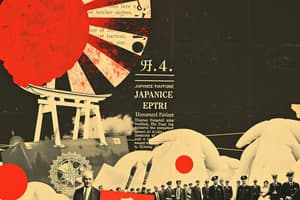Podcast
Questions and Answers
What was the primary source of production during the Industrialization period?
What was the primary source of production during the Industrialization period?
- Manufacturing (correct)
- Service industry
- Mining
- Agriculture
Who is credited with the invention of the steam engine, a key factor in Industrialization?
Who is credited with the invention of the steam engine, a key factor in Industrialization?
- Richard Arkwright
- Isaac Newton
- Leonardo da Vinci
- James Watt (correct)
What was a major cause of the American Revolution?
What was a major cause of the American Revolution?
- Foreign invasion
- Taxation without representation (correct)
- Religious persecution
- Slavery
What was a significant social effect of Industrialization?
What was a significant social effect of Industrialization?
What was a key factor in the development of new social classes during Industrialization?
What was a key factor in the development of new social classes during Industrialization?
Which event marked the beginning of the American Revolution?
Which event marked the beginning of the American Revolution?
Which ancient civilization developed governance in the form of city-states?
Which ancient civilization developed governance in the form of city-states?
Which leader was responsible for German aggression and expansion during World War II?
Which leader was responsible for German aggression and expansion during World War II?
What was the cultural and intellectual movement that took place in Europe between the 14th and 17th centuries?
What was the cultural and intellectual movement that took place in Europe between the 14th and 17th centuries?
Which ancient civilization developed philosophy, including the works of Socrates, Plato, and Aristotle?
Which ancient civilization developed philosophy, including the works of Socrates, Plato, and Aristotle?
Which event marked the end of World War II?
Which event marked the end of World War II?
Flashcards are hidden until you start studying
Study Notes
Industrialization
- Definition: The process of social and economic change where people move from agricultural to industrial jobs and manufacturing becomes the main source of production.
- Timeline: Late 18th century to early 19th century
- Key factors:
- Invention of the steam engine by James Watt
- Development of textile machinery by Richard Arkwright
- Construction of canals and railroads
- Effects:
- Increased productivity and efficiency
- Growth of cities and urban population
- Development of new social classes (industrialists, workers)
American Revolution
- Definition: A colonial revolt that took place between 1765 and 1783 in which the Thirteen Colonies in North America fought for and eventually gained independence from Great Britain.
- Causes:
- Taxation without representation
- Restrictions on trade and commerce
- Influence of Enlightenment ideas (e.g. liberty, democracy)
- Key events:
- Boston Tea Party (1773)
- Declaration of Independence (1776)
- Battle of Yorktown (1781)
- Key figures:
- George Washington
- Thomas Jefferson
- John Adams
Ancient Civilizations
- Mesopotamia:
- Located in modern-day Iraq
- Developed writing (cuneiform) and governance (city-states)
- Notable figures: Sargon, Hammurabi
- Ancient Egypt:
- Located in northeastern Africa
- Developed hieroglyphic writing and monumental architecture
- Notable figures: Pharaohs Khufu, Hatshepsut
- Ancient Greece:
- Located in southeastern Europe
- Developed philosophy (Socrates, Plato, Aristotle), theater, and democracy
- Notable figures: Alexander the Great
World War II
- Definition: A global conflict that lasted from 1939 to 1945, involving most of the world's nations, including all of the great powers.
- Causes:
- German aggression and expansion (Nazi Party)
- Appeasement policy of Britain and France
- Japanese invasion of China and Southeast Asia
- Key events:
- Invasion of Poland (1939)
- Battle of Stalingrad (1942-1943)
- D-Day invasion of Normandy (1944)
- Atomic bombings of Hiroshima and Nagasaki (1945)
- Key figures:
- Adolf Hitler
- Winston Churchill
- Joseph Stalin
- Franklin D. Roosevelt
Renaissance
- Definition: A cultural and intellectual movement that took place in Europe between the 14th and 17th centuries, marked by a revival of classical Greek and Roman culture.
- Key characteristics:
- Humanism (focus on human potential and achievements)
- Revival of classical learning and art
- Emergence of nation-states and monarchies
- Notable figures:
- Leonardo da Vinci
- Michelangelo
- Galileo Galilei
- William Shakespeare
Studying That Suits You
Use AI to generate personalized quizzes and flashcards to suit your learning preferences.



